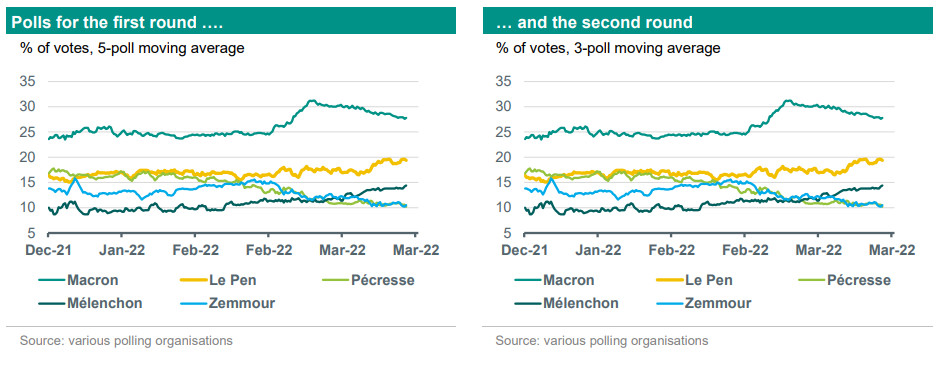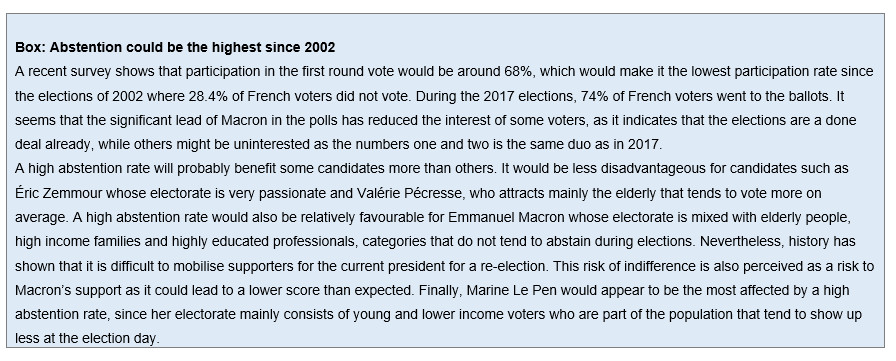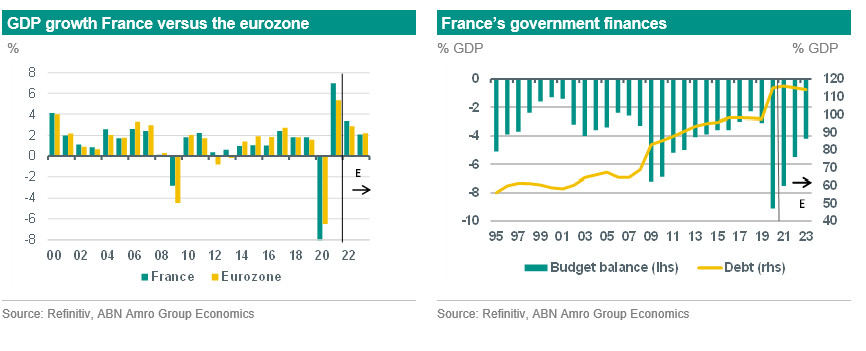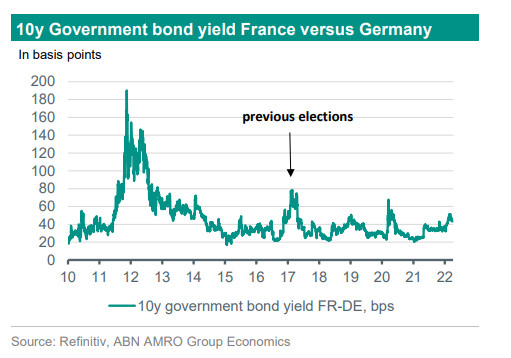French presidential election: five more years for Macron?


On 10 April the first round of the French presidential elections will be held and on 24 April the second round. In contrast to five years ago, when Emmanuel Macron was a candidate for the first time, the result probably will not be a close call this year, as Macron is running well ahead in the polls for the first round and the second round. The issues highest on his political agenda are to encourage labour market participation and employment growth, for instance by reforming the pension system and cutting corporate taxes, and to encourage further European integration. The impact of the elections on financial markets should remain limited.
On 10 April the first round of the French presidential elections will be held and on 24 April the second round
In contrast to five years ago, when Emmanuel Macron was a candidate for the first time, the result probably will not be a close call this year, as Macron is running well ahead in the polls for the first round
As it is unlikely that he will get enough votes to claim victory after just one election round he will have to compete in the second round, where he probably will meet Marine le Pen again, similar to five years ago
Polls for the second round indicate that a contest between Macron and any one of the other possible candidates will be won by Macron by a wide margin
The issues highest on his political agenda are to encourage labour market participation and employment growth, for instance by reforming the pension system and cutting corporate taxes, and to encourage further European integration
Macron’s policy plans will probably have limited impact on economic growth and government finances in 2022-23, but they could have a favourable impact on France’s longer term growth potential
Financial markets have not factored in the possibility of a significant change in France’s politics in the coming years
The likely continuation of the Macron presidency means that the impact of the elections on financial markets should remain limited
Introduction
The first round of the French presidential elections will be held on 10 April. French presidential elections are organised according to the runoff system. The first round is open to any candidate that is able to gather the 500 signatories of support from elected officials. If a candidate wins an absolute majority (50 percent plus one) in the first round (s)he is directly elected. However, this is unlikely looking at the current political landscape and election polls. Indeed, since the foundation of the 5th Republic in 1958, none of the presidential candidates has ever gathered 50% of the votes in the first round. As such, France usually has a second round of vote, organised 2 weeks later, between the two leading candidates. This year, the second round of voting will be held on 24 April. The candidate that receives the most votes in the second round is directly elected president. However, the formation of the government happens at a later stage, during the legislative election for the members of the Assemblée nationale (French lower house), which will be held one month after the presidential election in two rounds on 12 and 19 June 2022.
Macron well ahead in the polls for the first round …
Recent polls have shown a clear rise in the popularity of Emmanuel Macron (centre/centre-right) since the announcement of his candidacy early March. It seems his popularity was also boosted by the uncertainties related to the escalation of the Russia-Ukraine conflict, which might have reduced the desire for political change in France and other countries. Nevertheless, according to reports in the press about 40% of all French voters currently are still undecided and could change their voting intentions, implying that a victory for Macron is by no means certain. Adding to this is the risk of a record high abstention rate during the elections (see the text box below). Still, the size of the gap between Macron and the runner-up in the polls (Marine Le Pen – far-right) is very high and the chances of her catching up seem small. Indeed, during the first round in 2017, the gap between the two was about three points only, while the current polls show a gap of about ten points. Another factor working in favour of the centrist Macron is that both the left and the right sides of the political spectrum are fragmented. There are six candidates positioned to the left of Macron and four positioned to his right in the political spectrum, with some candidates getting only between one and five percent of the votes. Green candidate Yannick Jadot would get only around 5% of the votes. Competition between left and right wing candidates is reducing the probability that any one of them will end up close to Macron.
… as well as for round two
The polls for the second round of voting give Macron a clear lead over any of the other candidates he might be faced with (see graph above). The polls suggest that Marine Le Pen will be the other candidate in the second round, but support for Jean-Luc Mélenchon (far-left) has risen rapidly recently, positioning him at number three, well above Éric Zemmour (far-right) and Valérie Pécresse (centre-right). Still, Mélenchon would need to gain around five extra points to be able to qualify for the second round. The lead in the second round polls of Macron over Mélenchon is significantly larger than the gap between Macron and Le Pen. Indeed, the Macron-Le Pen gap seems to have narrowed compared to the result of the second round vote of 2017, which was won by Macron by 66.1%-33.9%. This could be due to the fact that Le Pen has been trying to become more palatable to the average French voter. She has dropped unpopular policies like leaving the euro, and has moved her political rhetoric away from the traditional immigration/insecurity topic to focus more on national freedom (linked to the pandemic restrictions) and even environmental issues. But more importantly, Marine Le Pen has been able to take ownership of the most important topic for the French this year: purchasing power. She has focused her campaign on this topic since the beginning and has presented herself as the one who will ‘give French people back their money’.
Main policy plans for the next five years
An overview of the policy plans of the main candidates can be found as an appendix at the back of the attached pdf-document. As re-election of Emmanuel Macron is very likely, we will focus on his economic and social agenda and the consequences for economic growth and government finances. The main issue on Macron’s economic agenda is reforming the pension system. The reform entails raising the retirement age to 65 from 62, as well as providing a minimum of EUR 1,100 per month when full retirement is completed. Besides reforming the pension system, Macron wants to support employment and economic growth by cutting corporate taxes by around EUR 7bn. Household income will be supported by another EUR 7bn tax cut. On the expenditure side Macron wants to raise spending on education (by EUR 12bn), energy transition (EUR 10bn), health care (EUR 8bn) and families and children (EUR 5bn). The total extra costs of EUR 50bn (equal to 2% of GDP), should not – according to his plans - result in extra government debt, but will be financed by gains from the pension reforms, extra economic growth and savings on public administration (reforms and more efficiency). Whereas Macron had a clear goal of limiting the budget deficit to the EC’s 3% maximum during his first term in office, he is less outspoken about that issue this time, merely mentioning that he would like to bring the budget balance back to -3% around 2027.
Macron could face the obstacle of not having a parliamentary majority after the legislative elections. Under France’s semi-presidential political system, if a president’s party is different to that of the majority of members in parliament, the government is divided – this is called ‘cohabitation’. Such a scenario cannot be ruled out in the event of a Macron victory. When this happens, the president can become a marginal figure in national politics, although they maintain pre-eminence in areas of foreign affairs and national security. In this case implementing reform becomes very difficult. We will publish an election preview in the weeks before the legislative elections in June.
Impact on economy and public finances
The impact of Macron’s policy plans on economic growth and government finances in 2022-2023 should be relatively limited. Still, the planned pension system reforms and measures aimed at stimulating employment could raise potential GDP growth in the longer term and help improve government finances. Similar to what happened in other countries, France’s government finances have deteriorated dramatically during the pandemic, with the budget balance deteriorating from -3.1% GDP in 2019 to -9.1% in 2020 and the debt ratio rising from 97.5% to 115%. The budget deficit is expected to decline noticeably in 2021-23 on the back of the economic recovery and unwinding of temporary pandemic-related support measures. Nevertheless the deficit is expected to be around 4% in 2023, well above the European Commission’s 3% limit (though there is growing support in Europe for some kind of change to these rules). The debt ratio is expected to edge modestly lower in the coming years. Compared to the other big eurozone countries France’s debt ratio is expected to be well above Germany’s (around 70%) in 2023, but below Italy’s and Spain’s (around 150% and 120%, respectively).
Impact on financial markets limited
Financial markets have not priced in any radical changes in France’s politics. The 10y bond yield spread over Germany has widened somewhat in recent weeks, but this was due to a general move into save havens related to the escalation of the Ukraine-Russia conflict. France’s spread has not widened more than any of its peers. This is in contrast to events five years ago, when Emmanuel Macron joined the race for the first time and the polls showed that he was neck-and-neck with Marine Le Pen, who had an anti-euro campaign at that time. Indeed, as the graph shows, France’s spread over Germany rose sharply in the months before those elections and declined after the results. Given the likely victory of Emmanuel Macron this year and his strong lead in the polls, we expect the impact of the election on financial markets to remain modest.



